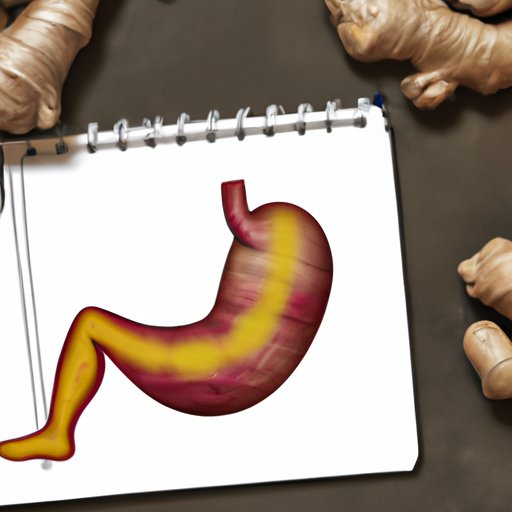
I. Introduction
Stomach pain can range from mild discomfort to debilitating pain. The causes of stomach pain are numerous, ranging from gastrointestinal issues to stress and anxiety. Whatever the cause, stomach pain can be unbearable and disruptive to one’s daily life. The purpose of this article is to explore six potential ways to make your stomach stop hurting instantly.
While the techniques mentioned in this article may work for many people, stomach pain can be a symptom of an underlying issue and it’s important to speak with a medical professional if stomach pain is persistent and severe.
The six potential ways we will explore in this article are natural remedies, diet modifications, medication options, acupressure and massage, stress management, and when to see a doctor.
II. Natural Remedies
Natural remedies are a safe and effective way to soothe stomach pain. Natural remedies are gentler on the stomach than medication and can be prepared easily at home.
Ginger is a natural anti-inflammatory and can help reduce stomach cramps and pain. Ginger can be consumed as a tea, in a capsule, or raw. Peppermint can help soothe the stomach and promote digestion. Peppermint can be consumed as a tea or in capsule form. Chamomile can help reduce inflammation in the stomach and reduce stomach cramps. Chamomile can be consumed as a tea. Fennel can promote digestion and reduce bloating. Fennel seeds can be chewed or consumed in tea form.
While natural remedies are generally safe, it’s important to note that certain herbs and spices may interact with medications or have additional side effects, so it’s important to consult with a doctor or pharmacist before trying any new remedies.
III. Diet Modifications
Modifying one’s diet can help reduce stomach pain. Certain foods can contribute to stomach pain, including spicy and fatty foods. Eating smaller and more frequent meals throughout the day can help reduce stress on the stomach and prevent pain. Focusing on easily digestible foods such as bananas, rice, applesauce, and toast (BRAT diet) can help soothe the stomach. Additional dietary tips include drinking plenty of water and avoiding caffeine and alcohol.
IV. Medication Options
Medication can provide quick relief for stomach pain. Antacids can help neutralize stomach acid and reduce heartburn. Proton pump inhibitors can reduce stomach acid production, and H2 blockers can decrease stomach acid secretion. The type of medication prescribed will depend on the cause of the stomach pain.
It’s important to note that medication can have potential side effects and may interact with other medications a person is taking. It’s important to consult with a physician or pharmacist to understand the risks and benefits of taking medication for stomach pain.
V. Acupressure and Massage
Acupressure and massage can help relieve tension and stress in the gut, reducing stomach pain. Acupressure involves applying pressure to specific points on the body to promote healing. For stomach pain relief, acupressure can be applied to the wrist, the forearm, or just below the knee. Massage can help improve digestion and reduce inflammation in the gut. Aromatherapy can also be used in conjunction with massage to help soothe the senses and promote relaxation.
It’s important to note that acupressure and massage should only be performed by qualified professionals and should be avoided if a person is pregnant or has a medical condition that may be affected by these treatments.
VI. Stress Management
Stress can contribute to stomach pain. Stress management techniques such as deep breathing, guided meditation, and yoga can help reduce stress and tension in the gut. Deep breathing involves inhaling through the nose and exhaling through the mouth, while guided meditation involves focusing on a specific thought or image and letting go of other thoughts. Yoga incorporates deep breathing and gentle movements to promote relaxation and reduce stress.
VII. When to See a Doctor
While stomach pain can often be relieved with at-home remedies, there are instances where medical attention may be necessary. If stomach pain is severe and persistent, it may be a sign of a more serious gastrointestinal issue. Common red flags to watch out for include blood in the stool, difficulty swallowing, and unexplained weight loss. It’s important to speak with a medical professional if stomach pain is severe, persistent, or accompanied by other symptoms.
VIII. Conclusion
Stomach pain can be debilitating and disruptive to one’s daily life. Fortunately, there are numerous ways to relieve stomach pain, including natural remedies, diet modifications, medication options, acupressure and massage, stress management, and knowing when to see a doctor. It’s important to explore different techniques to understand what works best for each individual. Remember, stomach pain is a common issue and seeking medical help when necessary can offer reassurance and peace of mind.
Start with natural remedies or diet modification and progress to medication and other techniques if necessary. Understanding the cause of stomach pain and what techniques work best can bring relief and improve overall health and wellness.




